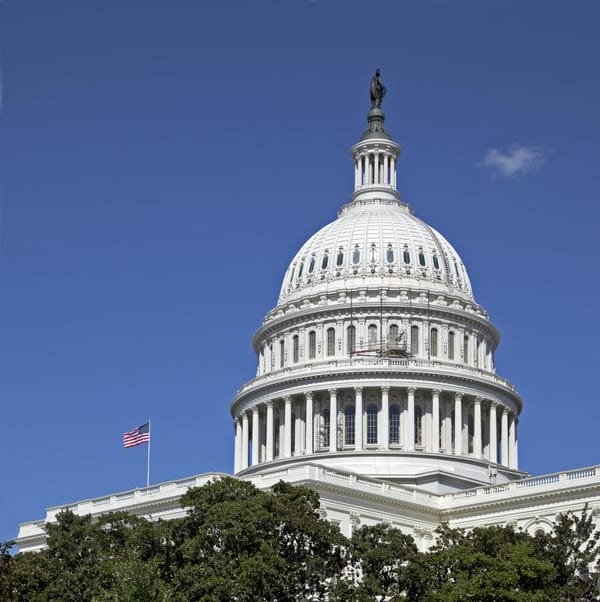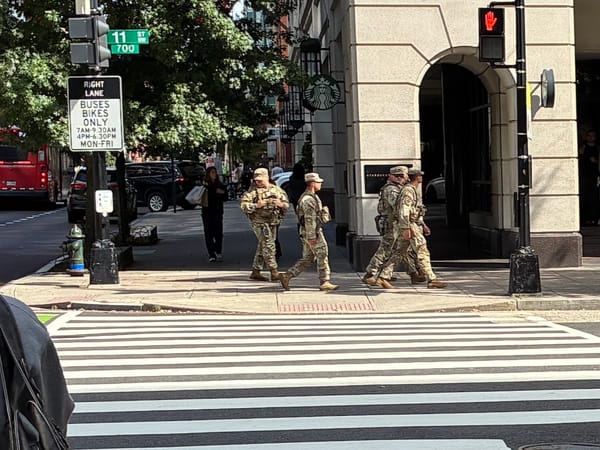On Starving Tyranny
Now is not the time for Jeffries or any other Democrats, especially Senate Democrats, to go weak in the knees over shutdown politics.

Nearly two weeks into the current government shutdown, we're seeing the initial signs of regime desperation over its effects. The endgame must be the financially induced collapse of the regime's state sponsored terrorism apparatus through the monetary starvation of Trump's masked, lawless stormtroopers and deployed National Guard personnel.
At 11 days into the latest federal government shutdown, the Trump regime displayed its first sign of alarm at the direction things were heading.
On Friday, October 11, POLITICO reported that
President Donald Trump’s administration is considering options to pay members of the military if the government shutdown drags on, according to two White House officials granted anonymity to discuss private deliberations.
Those options include Trump shifting available funds or pressing Republican leaders on Capitol Hill to put a standalone troop pay bill on the floor, according to one of the officials. The White House is not seeking a vote on troop pay at the moment and is reviewing internal options to address the pay issue, the other official said.
Active-duty military members are set to miss their paychecks Oct. 15 if Congress does not act.
“The president has been clear that he is going to pay the troops," one of the officials said.
This isn't the 1st century A.D. Roman Empire and Trump, despite his pretentions, is no emperor able to hand out cash to his Praetorian Guard. The president doesn't pay any federal workers, civilian or military; Congress does that via it's Article I appropriations power. POLITICO elected to let its unnamed source slide on that constitutional fact of life.
The Antideficiency Act (ADA) generally prohibits a president from "from obligating or expending federal funds in advance or in excess of an appropriation, and from accepting voluntary services," according to the Government Accountability Office (GAO). But of course, since Trump doesn't give a rip about the law, the fiscal sleight-of-hand continues.
Trump is executing a likely illegal work-around by directing Secretary of Defense Hegseth to reallocate roughly $8 billion in research, development, testing and evaluation (RDT&E) funds to pay military salaries when existing military payroll funds expire on October 15. This move explicitly violates the Purpose Act, but since it's unlikely federal courts would grant legal standing to any group of House or Senate members to challenge the legality of Trump's action, he'll likely get away with it.
Even so, that $8 billion would only cover the military's payroll for one two-week pay period. After that, no federal money for the active duty force or National Guard personnel called up under Title 32 authority.
Already, several Red state governors who've loaned out there National Guard to Trump for his political repression operations have said they'll withdraw their troops from cities like Washington, D.C. between October and November. It's unlikely most if not all of them would be willing to turn to their own citizens for more money to continue the out-of-state deployments if the federal shutdown goes on for weeks or months.
Indeed, normally staunch Trump ally Governor Kevin Stitt of Oklahoma has expressed opposition to Texas Governor Gregg Abbott's deployment of Texas National Guard personnel to Chicago at Trump's request. If Stitt's statement creates some political space for other GOP governors to exit or simply never participate in Trump's politicized of the use of the National Guard for political repression operations, it would be a very welcome development.
The ICE and other federal agents at DHS and DoJ have not been paid since October 1, nor will they be until the shutdown is over...which brings me to the centrality of economic self-interest in this fight for the survival of the Republic.
Estimates on the number of Americans who literally live paycheck to paycheck range from 52% to as high as 67%. For those in the $100,000 to $150,000 per year range, the estimates vary from 20% up to 50%. Indeed, entry level FBI agents only make between $66,000-$90,000 (and their entry level peers at DHS are likely in the same pay band), and even agents at the higher GS-13 pay level make $78,681-$102,288 base salary, or $98,351-$127,860 with availability pay.
That's literally thousands if not tens of thousands of federal law enforcement agents likely in the paycheck-to-paycheck category who have not and likely will not be paid for at least a month or more. It becomes easy to see how a prolonged shutdown could put such people in a financial bind in just a few weeks.
I asked Anthropic's Claude AI what the timeline could like, and this is Claude's estimate based on the variables I just outlined. For a multi-week or multi-month shutdown affecting GS-13 and below officers:
Week 1-2:
- Officers miss first paycheck
- Those living paycheck to paycheck (estimated 40-55% at these grades) immediately face crisis
- Credit card usage increases
Week 3-4:
- Second missed paycheck
- Mortgage/rent/student loan payments missed
- Officers begin facing choosing between meeting household expenses, mortgage/rent/student loan payments, and childcare costs
Month 2+:
- Multiple missed paychecks compound
- Financial devastation for families, potential evictions
- Officers may seek emergency loans or deplete retirement savings to try to prevent eviction or foreclosure
I've said previously that an extended shutdown (at least three months or longer) would be required to begin creating the kind of personnel losses at DHS and DoJ that will make warrantless immigration roundups and other forms of political repression far harder to carry out, if not functionally impossible to do at scale.
The only way this strategy would fail is if key House or Senate Democratic leaders show weakness in the money fight with Trump...which brings me to House Minority Leader Hakeem Jeffries.
Last week, Jeffries announced he was open to supporting a stand-alone funding bill to pay military salaries. That's exactly the sign of weakness that Trump, his OMB director Russ Vought, and his primary political strategist, Stephen Miller, are looking for from Democrats.
Trump's order to Hegseth to illegally move $8 billion in RDT&E funds to military payroll accounts is the opening phase of what will soon become the "Democrats hate our troops" propaganda campaign--a campaign that will go into overdrive once the $8 billion runs out in about two weeks’ time.
What cuts against the success of such a campaign is that very few Americans have a direct connection to the military anymore, and they are clearly not happy with Trump's flagrant, politicized misuse of the National Guard to help terrorize immigrant communities and other Americans.
On October 11, the Seventh Circuit Court of Appeals delivered another legal blow to the regime, permitting Trump to federalize some Illinois National Guard troops but not deploy them. That same day, a newly released Reuter/Ipsos poll showed that a clear majority of Americans want U.S. troops used abroad, not at home.
Trump's militarized domestic political repression campaign is a losing issue for the regime, and a winning one for those loyal to the constitutional Republic. Now is not the time for Jeffries or any other Democrats, especially Senate Democrats, to go weak in the knees over shutdown politics or alt-right echo chamber rantings. Senate Democrats need to keep the federal government shut down until Trump breaks. It remains the last peaceful way to bring the would-be dictator to heel.
REMINDER: You can get 30% off my new book about past episodes of unconstitutional surveillance and political repression, the Triumph of Fear, by going directly to the Georgetown University Press website and using the code TGUF...and this code can be used by anybody, so spread the word and thanks for being a Sentinel subscriber!





